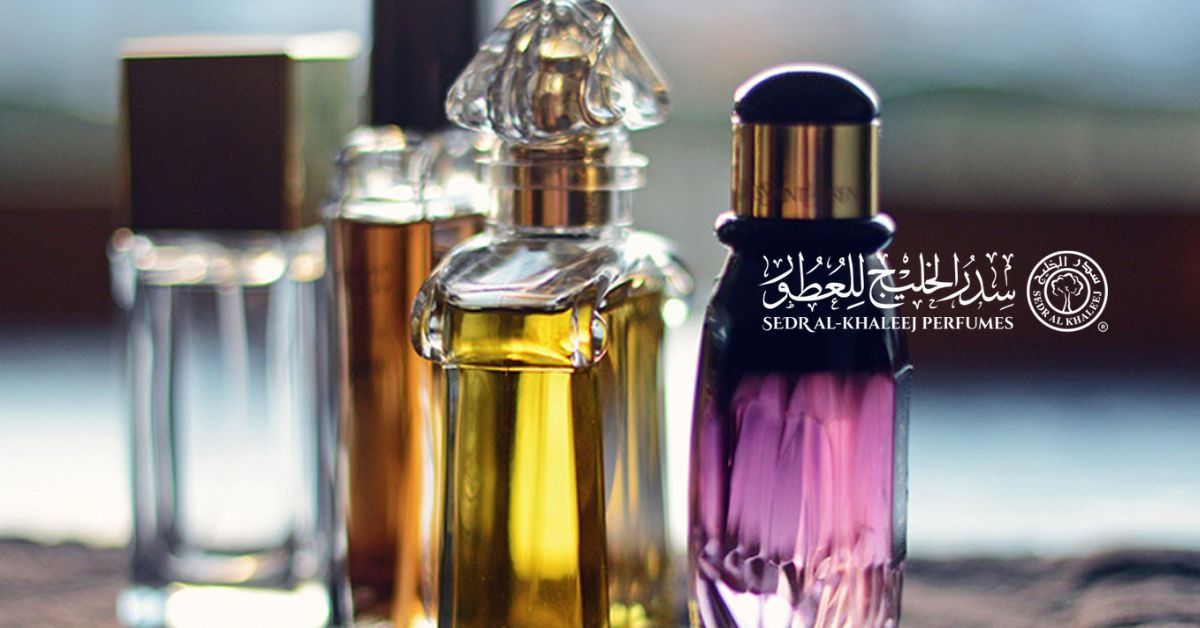The history of perfumery spans thousands of years, and it is constantly evolving to achieve greater diversity and appeal. The perfume industry is not limited to large companies only, but individuals can also create their own perfumes using essential oils .
In this article, we present to you a comprehensive guide from Sidr Al Khaleej Perfumes , where we will learn about the best essential aromatic oils that can be used to make perfumes in a distinctive and unique way.

What are essential oils?
Essential oils are concentrated compounds extracted from plants, containing the essence of the natural scent of those plants. These oils are typically extracted by steam distillation or cold pressing. Essential oils are used for a wide range of purposes, including perfumery, aromatherapy, and as ingredients in cosmetics and household products.
Here are some examples of popular essential oils and their sources:
- Lavender: It is extracted from the flowers of the lavender plant and is known for its pure and refreshing scent.
- Bergamot: Extracted from the peel of the bergamot fruit, it has a distinctive citrusy scent.
- Jasmine : It is obtained from jasmine flowers and is characterized by its sweet and rich scent.
- Sandalwood : Extracted from the wood of the sandalwood tree, it is known for its warm, deep, woody scent.
- Peppermint : Extracted from peppermint leaves, it provides a fresh and clean scent.
- Lemon: Extracted from lemon peel and known for its pure citrus scent.
These oils are essential building blocks in perfumery because they provide the main scents that make up a fragrance.
Essential Oil Basics
Essential oils are an essential part of the world of perfumery , and are the main ingredient that gives perfumes their unique character and scent. Let's first learn what essential oils are and how they are extracted.
What are essential oils and how are they extracted?
Essential oils are pure aromatic substances extracted from plants and flowers in specific ways. These oils contain natural aromatic compounds that give them their unique scents.
Extraction can be done by methods such as distillation and pressing, where steam or solvents are used to extract the oil from the plant material. Other methods such as puncturing and pressing can also be used.
The difference between essential oils and synthetic fragrance oils
Although both essential oils and synthetic fragrance oils are used in perfumery, there is a big difference between them. Essential oils are natural substances extracted from plants, while synthetic fragrance oils are made in laboratories using chemicals.
Essential oils have the purity and distinctive natural scents of nature, while synthetic fragrance oils offer a wide range of scents that can be precisely created.

Best Essential Oils for Perfume
1. Citrus oils
- Lemon : Lemon oil has a fresh, invigorating scent, making it ideal for summer fragrances.
- Bergamot : Bergamot oil has a distinctive citrus flavor and bright aroma, and is often used in fresh, light perfumes.
- Orange : Orange oil adds a touch of warmth and enthusiasm to perfumes, and is characterized by its sweet, citrusy scent.
2. Wood oils
- Sandalwood : Sandalwood oil gives perfumes a warm, rich flavour and is an ideal choice for oriental and woody fragrances.
- Cedar : Cedar oil has a deep, calming, woody scent and is commonly used in sophisticated perfumes.
- Patchouli : Patchouli oil gives perfumes a mysterious and earthy touch, and is characterized by its woody and spicy scent.
3. Floral oils
- Rose: Rose oil enhances perfumes with a soft, romantic floral flavour and is one of the most popular oils in the perfume industry.
- Lavender: Lavender oil is known for its calming and refreshing scent, and is used in everyday fragrances and relaxation products.
- Jasmine: Jasmine oil gives perfumes a luxurious floral touch and is considered a symbol of femininity and elegance.
4. Modern oils
- Vanilla Oil: Vanilla oil gives perfumes a sweet, creamy flavor and is used in warm, sweet fragrances.
- Cocoa Oil: Cocoa oil has a chocolatey, creamy scent and is used to add a delicious touch to perfumes.
- Coffee Oil: Coffee oil enhances fragrances with a roasted, spicy flavour, adding a distinctive coffee aroma.

Using essential oils in perfume making
Ideal proportions for using essential oils
When you decide to use essential oils or so-called raw essential oils to create your own perfume, you must consider the optimal proportions to ensure that the scents are balanced. The proportions in perfumes are usually as follows:
Base oil : Makes up about 15-30% of the fragrance.
Heart oils : They make up about 40-50% of the fragrance and express the main flavour of the perfume.
Base oils : make up about 10-20% and contribute to the stability of the scents and give the perfume its lasting character.
How to mix essential oils
To effectively blend essential oils , it is best to follow the directions of the heart you want for the fragrance . Professional tools such as glass cylinders or shaded bottles can be used to blend the oils. You should carefully experiment with the proportions and blends to achieve the desired fragrance.
Common Applications of Essential Oils in Perfumery
- Personal perfumes : You can create your own personal perfume that expresses your identity and your own taste.
- Body Oils : Essential oils can be added to body oils and lotions to care for the skin and add a refreshing scent.
- Vaporizers and Home Fragrances : Essential oils can be used in vaporizers and home products to give a place a distinctive scent.
- Hair Oils and Beard Oils : Essential oils can also be added to hair and beard care products to enhance their scent and nourish them.

Tips for Choosing Essential Oils
Choosing essential oils depends on your personal preferences and needs, and can be fun and creative. Always remember that quality and safety are key to your essential oil experience.
Personal preferences and types of perfumes
One should start by clarifying their personal preferences regarding fragrance types . Do you like floral and sweet fragrances or do you lean towards woody and citrusy fragrances ? This interest in fragrance styles will guide you in choosing the right essential oils.
Quality of essential oils
Quality is crucial when choosing essential oils . Make sure to purchase oils from trusted sources and recognized suppliers. High-quality oils will give you a natural, pure scent and a better experience.
Safety and Sensitivity
You should be careful about allergies and safety when using essential oils . Some oils may cause skin reactions in some people. Therefore, before applying oils directly to the skin, a simple test should be done on a small area of skin to check for allergies.

Storing and Caring for Essential Oils
Taking good care of your essential oils will help maintain their quality and shelf life. By following these guidelines, you can enjoy the benefits of essential oils for a longer period of time and use them effectively in perfumery, skincare and hair care .
How to Store Essential Oils Properly
Essential oils should be stored In specially designed shaded containers for their preservation. These bottles help prevent the harmful effect of light and air on the quality of the oils.
Store the containers in a cool, dry place, avoiding exposure to excessive heat and humidity, as the oils can deteriorate in these conditions.
Be sure to close the containers tightly after each use to prevent air from entering the oils.
Oil care to maintain its quality
- Avoid exposing the oils to direct sunlight as light can spoil the essential oils.
- Use a clean dropper when drawing oil from the bottle rather than pouring it directly from the bottle. This prevents possible contamination of the oil.
- Be careful not to leave the containers open for long periods of time, as some of the aromatic compounds can evaporate.
- Store oils out of reach of children and pets, as some oils can be toxic if swallowed or applied incorrectly.
Frequently Asked Questions About Raw Essential Oils
What is the difference between essential oils and regular fragrance oils?
Essential oils are natural substances extracted from plants in specific ways, while regular aromatic oils contain synthetic and chemical scents that have been produced in laboratories.
Can essential oils be used directly on the skin?
Essential oils can be used on the skin, but they must be diluted or mixed with carrier oils before use to avoid irritation.
Are there essential oils suitable for each season?
Yes, there are essential oils that are suitable for each season. For example, citrus oils are suitable for summer, while woody oils are suitable for fall and winter.
Can essential oils be used in making home fragrances?
Yes, essential oils can be used to make home fragrances. They are used to give your home a distinctive and wonderful scent.





Leave a comment
All comments are moderated before being published.
This site is protected by hCaptcha and the hCaptcha Privacy Policy and Terms of Service apply.